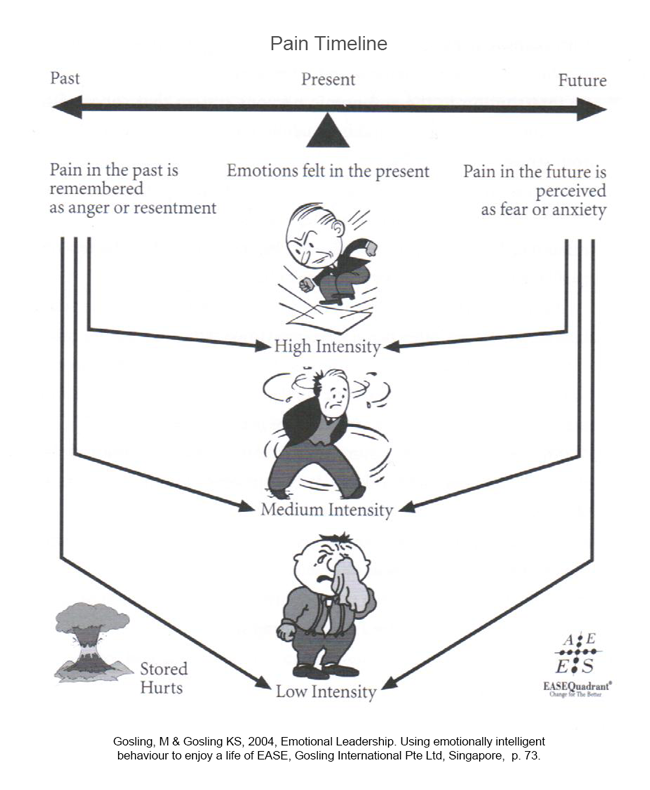Can you recognize your pain points on the pain timeline?
Are you feeling lots of pleasure points or is your life filled with anger, anxiety, guilt, remorse, shame, and regret — what I call stress?
We recognize the pain timeline to show visually how pain is present in the past, present and future. Pain perception is about how appraisal triggers arousal (emotional response) in your body. Deepak Chopra explains that cognitive appraisal in the brain arouses only two impulses—pain or pleasure.
We all want to avoid pain and experience pleasure. Therefore, all the complicated emotional states we find ourselves in are because we are unable to obey these basic drives. [1]
Deepak Chopra
Pleasure seems to be managed well by most people and is a non-problem status. Pain though is any unpleasant sensory and emotional experience. Acute pain is a normal sensation triggered in the autonomic nervous system to alert you to a possible injury. Chronic pain refers to discomfort relating to injury, disease or emotional distress. Chronic pain persists and may exist in the absence of any past physical injury or body damage.
Examples of chronic pain include; arthritis pain, cancer pain, headache, lower back (coccyx) pain, and pain from damage to the central nervous system itself.
Pain felt in the body can be depicted on a pain timeline.

Although pain affects your body’s responsiveness, its overall impact on you lies within you. Your perceptions therefore, are crucial in pain management.
All pain is felt in the body in the present—today. You cannot physically feel something yesterday or tomorrow. You can remember the pain of the past or anticipate a pain in the future, but you can only feel pain in the present.
- For example;
Where were you, what did you feel, and what you do when you first heard the news of the September 11, 2001 disaster in New York, USA—the October 12, 2002 bombing in Bali, Indonesia—the train bombing in Madrid, Spain on March 11, 2004? What did you feel over the next two to three days after each event? Did your body feel normal? What do you feel today when you recall those events?
All emotion is felt in the present at various levels of intensity; low, medium and high. Each time you experience a negative emotion—such as a hurt in the present, anger or resentment from a memory of the past, or fear and anxiety from perceived pain in the future—you are adding to your store of stress. The stronger (higher the intensity) you feel an emotion in your body, the greater the amount of stress and adrenalin that accumulates in your body.
Deepak Chopra explains the cycle of emotions that begins in the present (reality)—where only pain and pleasure are felt—and ends in complex emotions centered exclusively in the past, such as, guilt and depression (our perceived reality).
The cycle that gets repeated countless times in everyone’s life is as follows:
- Pain in the present is experienced as hurt.
- Pain in the past is remembered as anger. Anger starts with an internal or external event and is the subjective experience of physiological arousal (stress response) to negative appraisal of the event.
- Pain in the future is perceived as anxiety—a lessening of mental relaxation, associated to the alert reaction. Fear, and its manifestation, anxiety, is a painful emotion caused by impending danger or an evil event—a state of alarm, dread of something, or anxiety (extreme worry) over life changes.
- Unexpressed anger—redirected against you and held within—is called guilt.
- The depletion of energy that occurs when anger is redirected inward creates depression (Principle 62).
The cycle of emotion tells us that stored hurt is something we all have experience of to some degree, and is responsible for considerable adrenalin arousal. Chopra argues that, “Buried hurt disguises itself as anger, anxiety, guilt, and depression.” To live in the present we need to learn to avoid the easy emotion—anger, and deal with the hurt that is more difficult to confront. Unresolved anger will only grow worse, feeding on itself.
Sometimes you can cause another person pain by what you do or say. This external event may be intentional or unintentional, and may also create a pain for you; guilt, remorse, shame, and regret—that is, stress. For example, people who use ineffective communication (Principle 39) often drag up “history” in arguments to hurt their partner. Their perception is that their partner has hurt them or is “blaming” them in some way. They are using a conditioned response, to ease their own pain felt in the present—not realizing the physiological impact their behavior is having on their own body.
Pain is communicated to others through language, posture, withdrawal, and abuse, including physical, emotional, and sexual abuse. In an integrated model of the cognitive, affective, and physiological aspects of emotion, pain is manifested as negative emotion (accumulated stress) and can lead to nervous illness.
Knowing how to control your emotional pain is one of the most important steps in rebuilding your relationship.
When you’re trying to fix your relationship but your pain points are out of control, you will always end up struggling. It’s time to get some professional help.
You can change this today.
I can help you to:
- Grow your emotional skills – emotional skills are far more important than any functional skill in achieving a high level of peace and calm within oneself.
- Know your emotional style – your emotional style effects how you react in emotional situations.
- Understand your emotional brain – learn how your brain effects your personal emotions.
~~~~~~~~~~~~~~~~~
[1] Chopra, D 1993, Ageless Body, Timeless Mind, New York, Harmony Books, p. 186.

